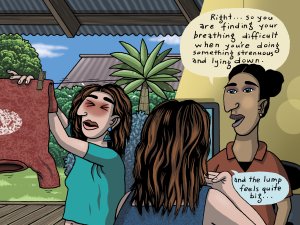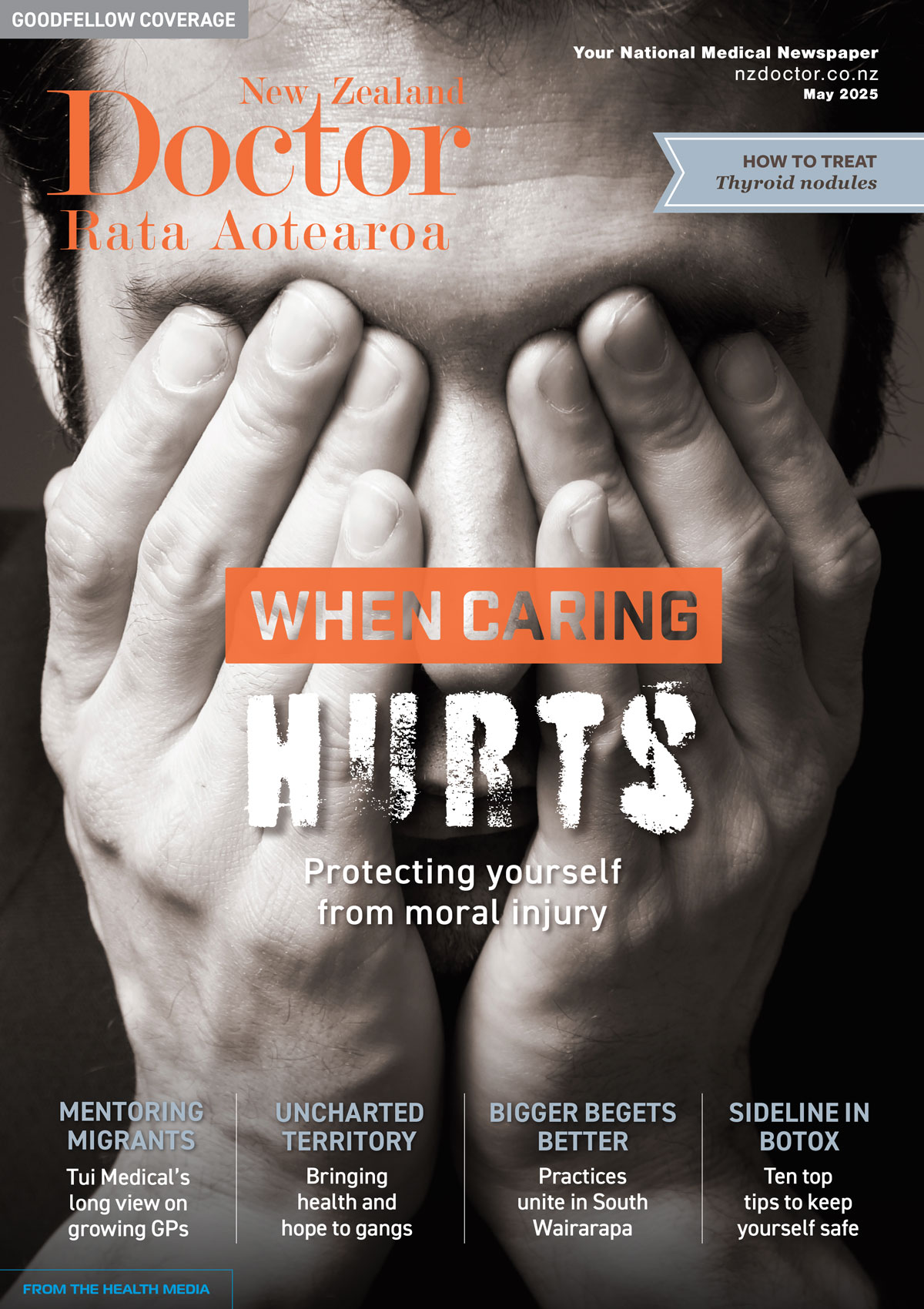Otolaryngologist, head and neck surgeon Francis T. Hall discusses the evaluation of thyroid nodules, which primarily aims to determine the likelihood of malignancy. He then reviews the treatment of thyroid nodules and thyroid cancer, including recent advances in management
Hundreds contacted as public health teams act quickly to ‘stamp out’ measles risk
Hundreds contacted as public health teams act quickly to ‘stamp out’ measles risk

Public health teams have undertaken a mammoth effort over the past week to contact almost 300 people identified as close contacts of an Auckland measles case.
As of today (May 16), there remains just one confirmed case of measles in the region, with no new cases or locations of interest identified. The person was infected overseas following recent travel.
Since the case was confirmed on May 10, public health teams have:
• Reached out to 286 ‘close contacts’ (people who have been in ‘close contact’ or proximity to the measles case). Of those, 206 no longer need to quarantine.
• Continued to actively manage 78 contacts in quarantine as a precautionary measure, 19 are awaiting serology (blood) test results to confirm their measles immunity status.
• Confirmed 17 exposure events across wider Auckland and four locations of interest.
• Offered and encouraged MMR vaccinations to anyone identified as non-immune.
• Coordinated through community providers delivery of 50 food packages to people in quarantine who cannot access food services.
• Identified no further measles cases, or locations of interest.
"Because measles is one of our most serious and highly contagious illnesses, where one infectious person can infect as many as 12 to18 other people on average, our teams have focussed on moving as quickly as possible to reduce the spread,” Dr Susan Jack, National Director, Protection, NPHS, says.
“Following confirmation of the case last weekend, NPHS staff across the motu have pulled out all the stops this week to identify every possible location where members of the public may have been exposed, and then to identify as many individuals as possible who might have been at risk.
“This has led to our kaimahi making hundreds of phone calls and sending texts and emails out across Auckland and further, and in some cases, door-knocking to follow up on anyone who have been difficult to get hold of,” Dr Jack says.
Anyone identified during tracing efforts as not being immune (people are considered immune if they have evidence of having had measles before or can confirm they’ve had two doses of the MMR vaccine after 12 months-old) was asked to quarantine.
“Vaccination with two doses of the MMR vaccine remains the absolute best protection against becoming seriously unwell with measles. The vaccine is 99 per cent effective after two doses and for most people there’s no risk in having an extra dose if it’s needed. Now is the time for you and your whānau to check if you’re protected against measles, and to get immunised if you’re not, or if you’re unsure,” Dr Jack says.
This is particularly important for infants and young children, and also adults who were born or lived in New Zealand between 1969 and 2004 (now aged between 21 and 56 years-old), who may not fully protected, so need to check their immunisation status. If you have had two documented doses of MMR, you will never need to go into quarantine even if exposed to a measles case.
“Anyone intending to travel internationally should also make sure they are up to date with two doses of the MMR vaccine, given there are outbreaks currently in many overseas countries, and the risk of bringing measles back here and sparking an outbreak is very high. Getting immunised before you travel will also stop you spreading measles to those in other countries if you have the virus and aren’t aware.”




![New Zealand Doctor Rata Aotearoa editor Barbara Fountain, RNZCGP president elect and Tauranga-based specialist GP Luke Bradford, Ministry of Health clinical chief advisor rural health Helen MacGregor, and Health New Zealand Te Whatu Ora clinical director primary and community care Sarah Clarke [Image: NZD]](/sites/default/files/styles/thumbnail_cropped_100/public/2025-05/1.%20Barbara%20Fountain%2C%20Luke%20Bradford%2C%20Helen%20MacGregor%20and%20Sarah%20Clarke.jpg?itok=091NETXI)
![Ngāti Porou Oranga specialist GP Elina Pekansaari and Te Nikau Hospital specialist in general practice and rural hospital medicine David Short [Image: NZD]](/sites/default/files/styles/thumbnail_cropped_100/public/2025-05/2.%20Elina%20Pekansaari%20and%20David%20Short.jpg?itok=h5XfSBVM)
![Locum specialist GP Margriet Dijkstra and OmniHealth regional operations manager (southern) Patricia Morais-Ross [Image: NZD]](/sites/default/files/styles/thumbnail_cropped_100/public/2025-05/3.%20Margriet%20Dijkstra%20and%20Patricia%20Morais-Ross.jpg?itok=jkrtRfJC)
![Golden Bay dairy farmer and dairy industry health and safety doctoral student Deborah Rhodes, and Golden Bay Community Health specialist GP Rachael Cowie [Image: NZD]](/sites/default/files/styles/thumbnail_cropped_100/public/2025-05/4.%20Deborah%20Rhodes%20and%20Rachael%20Cowie.jpg?itok=oM0_GcJc)
![Hauora Taiwhenua clinical director rural health Jeremy Webber, Australian College of Rural and Remote Medicine president Rod Martin and Observa Care director of business operations Deborah Martin, the wife of Dr Martin [Image: NZD]](/sites/default/files/styles/thumbnail_cropped_100/public/2025-05/5.%20Jeremy%20Webber%2C%20Rod%20Martin%20and%20Deborah%20Martin%2C%20the%20wife%20of%20Dr%20Martin.jpg?itok=P_aGmX_H)
![Spark Health chief executive John Macaskill-Smith and client director Bryan Bunz [Image: NZD]](/sites/default/files/styles/thumbnail_cropped_100/public/2025-05/6.%20John%20Macaskill-Smith%20and%20Bryan%20Bunz.jpg?itok=5yJvVZ0I)
![Associate dean (rural) Kyle Eggleton, third-year medical student Roselle Winter, and second-year pharmacy student Alina Khanal, all from the University of Auckland [Image: NZD]](/sites/default/files/styles/thumbnail_cropped_100/public/2025-05/7.%20Kyle%20Eggleton%2C%20Roselle%20Winter%20and%20Alina%20Khanal.jpg?itok=RQLd3TEs)
![Health New Zealand Te Whatu Ora clinical editor and specialist in general practice and rural hospital medicine Anu Shinnamon, and Whakarongorau chief clinical officer Ruth Large [Image: NZD]](/sites/default/files/styles/thumbnail_cropped_100/public/2025-05/8.%20Anu%20Shinnamon%20and%20Ruth%20Large.jpg?itok=i5TMswY9)
![Te Kahu Hauora Practice specialist GP Jane Laver and Ngāti Kahungunu ki Tāmaki-nui-a-Rua chief operations manager Tania Chamberlain [Image: NZD]](/sites/default/files/styles/thumbnail_cropped_100/public/2025-05/9.%20Jane%20Laver%20and%20Tania%20Chamberlain.jpg?itok=jtMklaCZ)